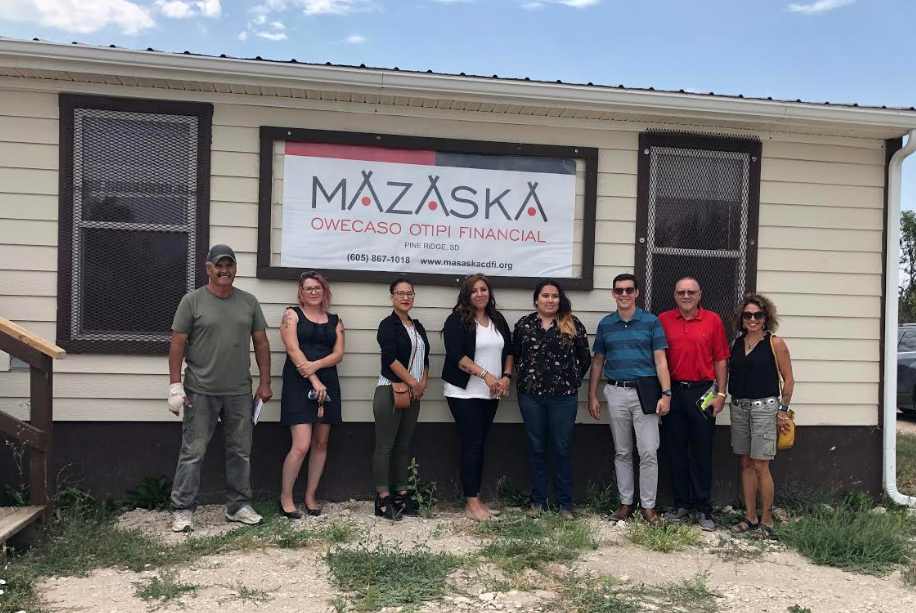
- Details
- By Native News Online Staff
PINE RIDGE INDIAN RESERVATION — The South Dakota Native Homeownership Coalition is working to increase homeownership among American Indian veterans.
A pair of American Indian community development financial institutions (CDFIs) recently hosted a reservation-wide tour for state and federal officials to highlight housing loan programs available to Native veterans. The two CDFIs — Lakota Funds and Mazaska Owecaso Otipi Financial — toured the reservation with staff members of Sen. Mike Rounds (R-S.D.) as well as Michael Bekaert, director of In-State Military and Veterans Affairs, and George Cannizzaro, Veterans Affairs fellow.
“We are so thankful to George and Mike for taking the time to visit with us and really get a true understanding for the environment we are working in, the challenges our Native veterans are facing when it comes to purchasing a home, and the success we’ve had with implementing new and innovative models to support our veterans in becoming homeowners,” says Tawney Brunsch, executive director of Lakota Funds and also a member of the Coalition’s Native Veterans Homeownership Committee.
The tour met with American Indian veterans at their homes to highlight various loan products they had utilized – including the Mazaska construction loan, the USDA 502, and the Veterans Affairs’ Native American Direct Loan (NADL).
The visits allowed the veterans to recount the challenges encountered and strategies used by loan-service providers to overcome the obstacles.
One strategy highlighted was a newly developed guide to homeownership for Oglala Sioux veterans, created by Mazaska with funding from Enterprise Community Partners. The printed guide helps Native veterans on Pine Ridge navigate the homeownership process and includes several resources.
“Many of the veterans we work with are almost ready to give up because they’ve run into so many roadblocks trying to buy a home. Some have been at it for years. What we have found is that relationships matter – not just with our local veterans but also with other lenders, the tribe, Bureau of Indian Affairs, Indian Health Service, and our many community partners. We serve as a liaison between the veteran and these agencies and resources to keep the process moving,” Steph Provost, loan officer at Mazaska said.
The Coalition spent several months working with Rounds’ office to streamline the NADL program.
In June, Rounds, a member of the Senate Veterans’ Affairs Committee, along with Chairman Jerry Moran (R-KS) and Ranking Member Jon Tester (D-MT), called on the Government Accountability Office to review the NADL program. The senators requested the evaluation of the NADL program out of concern that it is not effectively serving Native American veterans. This request proved to be a critical step towards programmatic improvement through legislative or other means.
“Homeownership on tribal lands can be a complex process, but we are continuing to chip away at the barriers to ensure that our veterans are compensated for the sacrifices they have made. It is exciting to see progress and the level of congressional support we have,” said Lakota Funds’ Brunsch.
Sen. Rounds will also host a listening session this Thursday, September 3, 2020, for him to personally discuss reform strategies with Native veteran homebuyers and the Coalition members that support them.
More Stories Like This
Native News Weekly (August 25, 2024): D.C. BriefsUS Presidents in Their Own Words Concerning American Indians
Wounded Knee Massacre Site Protection Bill Passes Congress
Two Murdered on Colville Indian Reservation
NDAA passes House; Lumbee Fairness Act Advances
Help us defend tribal sovereignty.
At Native News Online, our mission is rooted in telling the stories that strengthen sovereignty and uplift Indigenous voices — not just at year’s end, but every single day.
Because of your generosity last year, we were able to keep our reporters on the ground in tribal communities, at national gatherings and in the halls of Congress — covering the issues that matter most to Indian Country: sovereignty, culture, education, health and economic opportunity.
That support sustained us through a tough year in 2025. Now, as we look to the year ahead, we need your help right now to ensure warrior journalism remains strong — reporting that defends tribal sovereignty, amplifies Native truth, and holds power accountable.
 The stakes couldn't be higher. Your support keeps Native voices heard, Native stories told and Native sovereignty defended.
The stakes couldn't be higher. Your support keeps Native voices heard, Native stories told and Native sovereignty defended.
Stand with Warrior Journalism today.
Levi Rickert (Potawatomi), Editor & Publisher

